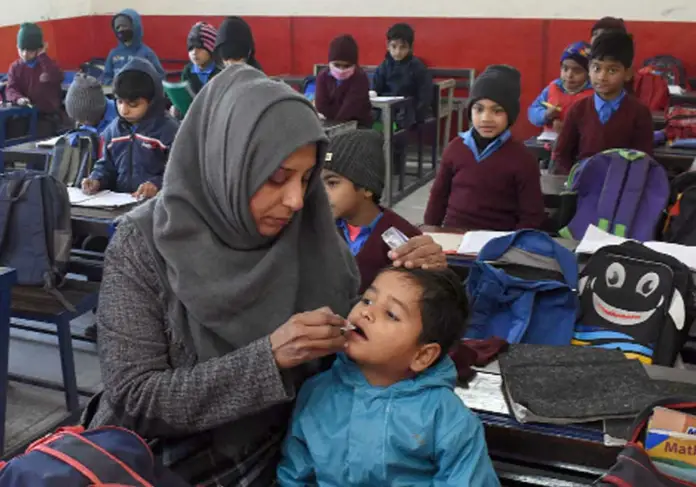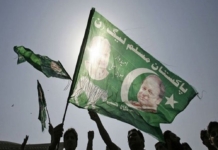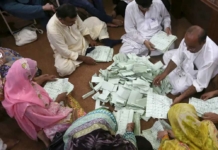It’s nearly afternoon in this arid town. Temperatures in a hamlet in the Rahim Yar Khan district of south Punjab have risen above 35 degrees Celsius even in March. A group of men taking shelter under a tree to avoid a bit of sweltering desert heat are found engrossed in a discussion. They have gathered around the district’s communication officer, Muhammad Sajid, who is talking about their methods to safeguard children from vaccine-preventable diseases such as polio.
“Are you familiar with polio?” Sajid inquires about the attendees.
“What happens to a youngster if, God forbid, he gets polio?” asks the communication officer once more.
Men of various ages glance back at Sajid with wonder and intrigue, waiting for an answer.
“The child is paralyzed for life”, the communication officer discloses.
“If children are not vaccinated against polio and other preventable diseases which are part of the essential immunization schedule, they can fall prey to the virus very easily”, Sajid observes.
“Disability is lifelong and there is no cure once the child has contracted the disease”, he elaborates urging the community to vaccinate children on time against all preventable diseases.
Punjab, like the rest of the country, is not confronted with the prospect of strong parental opposition. However, it is an affluent province that attracts people from all across Pakistan. People living in metropolitan centres such as Lahore, Rawalpindi, Multan, and South Punjab, especially Rahim Yar Khan, have reservations about polio eradication efforts.
Furthermore, such communities are more vulnerable to the virus and run the danger of spreading it to previously certified polio-free areas. Rahim Yar Khan attracts large nomadic populations that come to feed their cattle throughout the winter and rainy seasons. Muhammad Sajid, the Communication Officer, keeps track of the population by establishing contact with the population elders. Sajid deploys a team of social mobilizers and a vaccinator once the campaign begins. He enters the desert early in the morning. He talks with parents and listens to their concerns, enlisting the help of community elders. Along with social mobilizers and immunisation, he registers and vaccinates every newborn children on the spot.
“Whenever new populations start migrating here in winter, I load vaccine carrier in my car and reach this settlement”, he says.
“Hundreds of children start arriving in the desert with their families in winter and with the onset of rainfall. I help all children under five get polio eradication drops,” Sajid adds.
“Most of the families arrive here via non-traditional routes on their camels and trolleys. As communities who arrive here are travelling to different parts of the country very frequently, their children are susceptible to polioviruses.
“Keeping in view their traditions I do not camp closer to their settlements. The families are informed about vaccination activities through their elders. Soon children start arriving and we begin vaccination,” he says.
According to available data, the desert contains over 300 settlements. Some of those who have arrived are from interior Sindh and Balochistan. The World Health Organization has included Rahim Yar Khan in the central Pakistan epidemiological block due to the presence of such populations, as well as other factors such as a high percentage of missed children in polio campaigns, hard-to-reach areas, security, and the risk of sub-optimal routine immunisation. Because of the aforementioned challenges, this block is classified as very susceptible to polio. Keeping track of such transient people, listening to their concerns, and immunising them is critical for the Pakistan Polio Eradication Initiative.
“Initially caregivers had reservations about the polio vaccine, but I started engaging them through locals and elders of their community,” Sajid says.
“I then involved the community elders. Slowly the communities turned very cooperative. Through the engagement of elders, I have been able to dispel various myths about family planning associated with the oral polio vaccine. If communities continue to cooperate we will not let virus win in this area,” observes the communication officer.
Punjab is polio-free for over two years now. But polio environmental samples tested positive from Lahore in January 2023. The last polio case was reported in Punjab in 2020. Same year Punjab reported 14 polio cases, one of them from Rahim Yar Khan. While the countrywide tally of polio cases stood at 84. 2019 and 2020 were particularly challenging years for polio eradication efforts in Pakistan with 147 and 84 polio cases reported. Punjab accounted for 14 and 12 cases in both years respectively.
Head of the Punjab polio programme Mr Khizer Afzaal says the government plans to interrupt poliovirus transmission this year. “Vaccination of all children is key to breaking this transmission. If we continue to miss children belonging to mobile populations there is a high probability that the virus will find refuge and hit back”, cautions the EOC head.
“Reaching and sustaining zero polio cases and transmission requires even greater efforts. To achieve this level of coverage, the community should be aware that vaccines are beneficial and safe and the parents can trust the polio programme.”, the head of the polio programme added.







